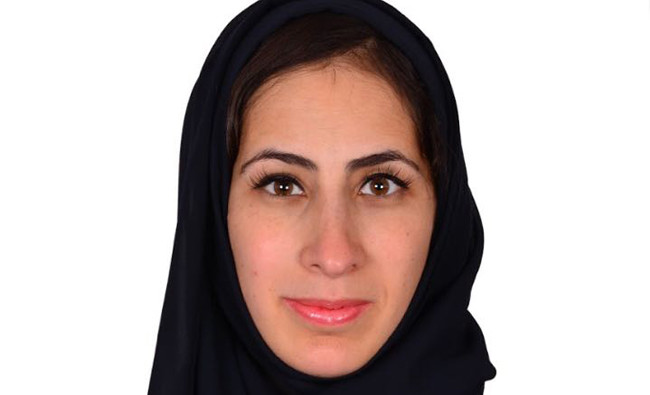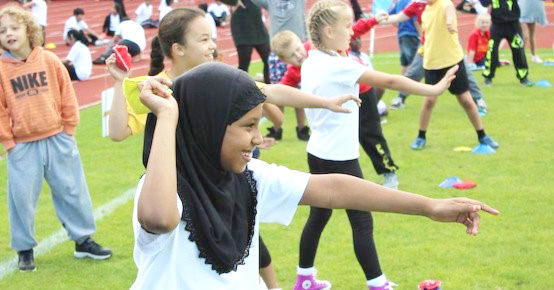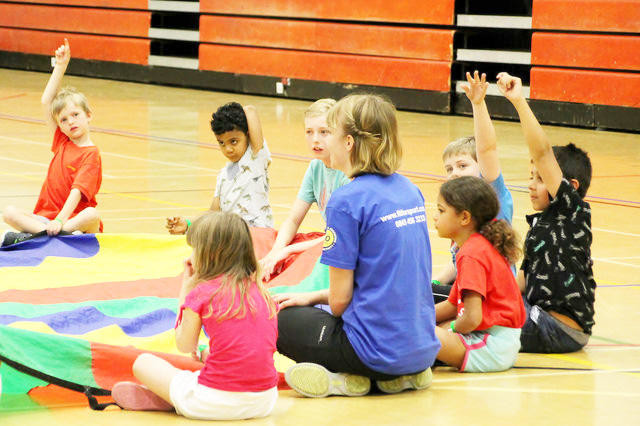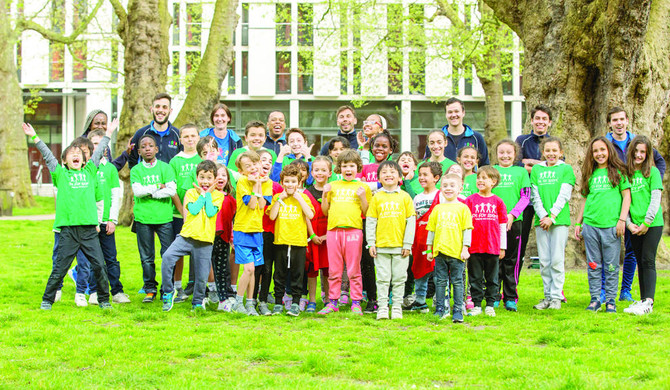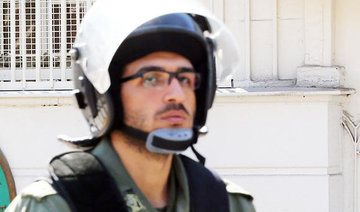LONDON: Saudi visitors to London are turning to fitness camps to give their kids a vacation workout.
The west London-based summer camp Fit for Sport has seen record numbers of visiting Arab children signing up for nine weeks of activities, the firm’s owner Dean Horridge told Arab News.
He said 70 percent of the camp’s pupils are Arabs, hailing from countries such as Saudi Arabia and the UAE.
With the camp’s upmarket South Kensington site just a stone’s throw from Hyde Park, 110 children are coached in daily activities such as swimming and rock climbing, from July to September, at a cost of around £240 ($309) per week.
“We work a lot with the local Arab embassies. The children come to London in the summer months as the Gulf region is too hot,” said Horridge, who runs summer camps across the country and works with 250 UK schools to provide after-class activities and PE curriculum support.
“Our camps are a great chance to showcase how it feels to be active and, more importantly, how much better the children feel after activity,” he added.
“Initially there’s a reluctance for children to get involved in the sports activities we provide, but very quickly they realize this is fun. The difficulty is trying to convey that back to the parent.”
Horridge said he welcomes the UAE’s recent move to raise the price of soft drinks and energy drinks by up to 100 percent.
“Some of the children come with lunchboxes that are full of junk and don’t have the right food. Some of them have nannies that bring the food at lunchtime. No 7-year-old needs a bucket of rice for lunch, but they’ll eat it just because it’s part of life and the norm,” he said.
“We encourage some healthy snacks like apples, which help children to lose weight. The kids start off very unfit, so we have to embed a program that builds up their confidence and makes them gradually fitter. We have to be careful as we don’t want to damage their self-esteem.”
Dr. Nada Farsi, a Saudi dentist based in London for the summer months, has enrolled her children Maya (10) and Zahair (5) in the South Kensington summer camp.
“They love it very much. They’re happy doing different activities, such as lots of walking to museums and parks,” she told Arab News.
“It’s the nature of the city, and they always get excited by looking at how many steps they’ve done.”
Farsi said she leads an active lifestyle and goes to an adult boot camp three times a week. “Physical health is so important, and I want to pass that on to my children,” she added.
“I also send the children to basketball and soccer classes in Jeddah for four hours a week. In the beginning they found it hard, but now they enjoy it as they’re used to it.”
She said levels of obesity in Jeddah concern her. “I see many obese kids. They shouldn’t be that obese, and I wonder how they’ll fare into adulthood.”
Farsi urged more government initiatives to encourage physical activity among the population. “PE lessons for girls have just been implemented, but we need more. We need more sidewalks and cycle lanes,” she said.
“We want to walk but we can’t. I miss this in Saudi Arabia. We need more parks and green places.”
Sin taxes, such as those introduced in Saudi Arabia and the UAE on sugary drinks, could help quell the region’s child obesity epidemic and encourage more active lifestyles, said Sonia Saxena, professor of primary care and head of the child health unit at the School of Public Health, Imperial College, London.
“The UK government has introduced similar measures but they don’t go far enough,” Saxena said. “This move from the UAE is bold and very welcome.”
She added that raising the price of soft drinks has already been proven to reduce obesity in countries such as Mexico. “All the evidence shows this is a good move,” she said.
The researcher, who is a visiting coach for the Dubai government on child obesity issues, added that soft drinks have “considerable sugar,” which can contribute to obesity in children and adults.
“Children and adults also need to eat five fruit and vegetables a day, decrease their sedentary activity and screen time, and increase exercise activity,” Saxena said.
“Most importantly, there needs to be a regional change in the culture. There has to be a culture that permits and promotes children to be active.”
Horridge said regional governments should take a 360-degree approach. “It’s a partnership between schools and parents to get kids active. If you don’t get kids active and eating healthily from an early age, children become overweight, disengaged and very lazy,” he said.
“Unfortunately, if that’s embedded at a young age it lasts a lifetime. This is very important to prevent issues such as diabetes, obesity and heart disease.”
Saudi kids flock to London fitness camps amid regional obesity epidemic
Saudi kids flock to London fitness camps amid regional obesity epidemic
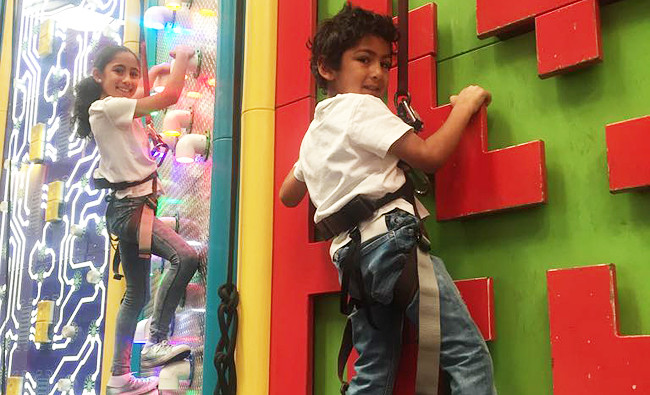
Saudi fashion event highlights retail trends, youth culture, and digital innovation

- Speakers noted that the increase in entertainment activities such as concerts and dining in the Kingdom in recent years has led to higher demand for fashion products because people are looking for ways to express themselves
RIYADH: A Riyadh fashion seminar on Sunday brought together industry leaders and creatives to explore the future of Saudi Arabia’s fashion economy.
Hosted by Chalhoub Group at Lakum Art Space, the event featured keynote presentations, panel discussions, and displays by 10 emerging Saudi designers from The Fashion Lab Cohort 2.

The agenda focused on three main themes: the evolution of fashion retail in the Kingdom; the role of cultural identity in building brands; and the rising importance of digital fashion and collaboration.
An awards ceremony honored the standout talents of this year’s cohort: APOA, Awaken, Bucketbox, Mona Al-Shebil, Noble & Fresh, Nora Al-Shaikh, Rebirth, Samar Nasraldin, The Untitled Project and USCITA.
FASTFACT
Hosted by Chalhoub Group at Lakum Art Space, the event featured keynote presentations, panel discussions, and displays by 10 emerging Saudi designers from The Fashion Lab Cohort 2.
One discussion explored consumer behavior in Saudi Arabia, revealing that the local market continues to grow despite global slowdowns.

Speakers noted that the increase in entertainment activities such as concerts and dining in the Kingdom in recent years has led to higher demand for fashion products because people are looking for ways to express themselves.
Retail experiences — both physical and digital — were emphasized as key to engaging Saudi consumers.

Youth culture, streetwear and sports are shaping brand narratives, a panel heard. Speakers discussed how fashion is being used as a tool for cultural storytelling, with an emphasis on grassroots creativity and community building.
Another topic highlighted the power of collaboration between local and international brands. Panelists discussed the importance of long-term partnerships, manufacturing localization, and mentorship to bridge gaps in knowledge and infrastructure.
Speakers also addressed the future of digital fashion, including virtual design, retail innovation, and new marketing strategies targeting Gen Z.
Saudi Arabia’s growing role in shaping the regional and global fashion economy was a prominent theme of the discussions.
First Saudi-Maldives forum to tackle transparency, governance in tourism

- Discussions aim to support sustainable development, promote safe tourism environment
RIYADH: Saudi Arabia — in partnership with the Maldives — is organizing the tourism sector’s inaugural Saudi-Maldives International Forum on Integrity, which is set to take place in the Maldives from May 6 to 7.
The forum is jointly organized by Saudi Arabia’s Oversight and Anti-Corruption Authority, and the Maldives’ Anti-Corruption Commission, in cooperation with the Organisation of Islamic Cooperation.
It will cover key topics such as enhancing transparency and governance in the tourism sector, combating corruption, and boosting international partnerships and expertise exchange among member states and regional and international organizations.
The discussions aim to support sustainable development and promote a trustworthy and safe tourism environment, the Saudi Press Agency reported.
The forum is expected to attract international participation from more than 40 countries and 10 regional and international organizations.
Attendees will include ministers, heads, and representatives of anti-corruption bodies from OIC member states, as well as key international organizations like the UN Office on Drugs and Crime, Interpol, the Global Operational Network of Anti-Corruption Law Enforcement Authorities, and the UN Development Programme. Local and international experts will also take part.
Organizing the forum reflects Saudi Arabia’s commitment to global efforts promoting transparency and accountability in tourism, according to the SPA.
The event highlights Saudi Arabia’s recognition of tourism as a key driver of sustainable development, in line with Vision 2030. It aims to build a thriving tourism sector, diversify national income sources, and stimulate economic growth.
Saudi deputy minister receives Pakistan’s ambassador

- They discussed bilateral relations as well as prominent developments in regional and international arenas
RIYADH: Saudi Deputy Minister for Foreign Affairs Waleed Elkhereiji received Pakistan’s Ambassador to the Kingdom Ahmed Farooq in Riyadh on Sunday.
During the meeting, they discussed bilateral relations as well as prominent developments in regional and international arenas, the Foreign Ministry wrote on X.
Meanwhile, Saudi Deputy Minister for International Multilateral Affairs Abdulrahman Al-Rassi received EU Ambassador to Saudi Arabia Christophe Varno in Riyadh.
Iraqi president invites King Salman to upcoming Arab summits in Baghdad

- Invitation was delivered to Foreign Minister Prince Faisal bin Farhan by Iraqi counterpart
RIYADH: King Salman received an official invitation from Iraqi President Abdullatif Jamal Rashid on Sunday to attend the 34th regular session of the Arab League Council at the summit level, as well as the fifth Arab Economic and Social Development Summit, both set to be hosted by Iraq later this month.
The invitation was delivered to Foreign Minister Prince Faisal bin Farhan during a meeting in Riyadh with Iraqi Deputy Prime Minister and Foreign Minister Fuad Mohammed Hussein, the Saudi Press Agency reported.
The two officials discussed ties between the two countries and reviewed key regional and international developments.
The meeting was also attended by Saud Al-Sati, Undersecretary of the Ministry for Political Affairs.
Riyadh conference discusses future of occupational health

- Minister launches initiatives to enhance Kingdom’s workplace safety
RIYADH: The seventh Global Occupational Safety and Health Conference opened in Riyadh on Sunday under the theme “The Future of Occupational Safety and Health.”
The three-day event was inaugurated by Ahmed Al-Rajhi, minister of human resources and social development and chairman of the National Council for Occupational Safety and Health.
Al-Rajhi launched initiatives to enhance Saudi Arabia’s occupational safety and health system, including the establishment of the National Institute for Occupational Safety and Health, the National Compliance and Excellence Incentives Program, and the Occupational Safety and Health Standards Guide.
Al-Rajhi said that work-related deaths in Saudi Arabia have dropped to less than one per 100,000 workers since the council’s establishment.
Meanwhile, the number of locals in occupational safety and health roles has risen by 130 percent, reaching more than 29,000 by the end of 2024, compared with 2022.
Al-Rajhi also highlighted improvements in safety compliance and automation. “The compliance rate with safety standards reached 72 percent by the end of 2024, and the automation of safety procedures exceeded 62 percent, up from 30 percent in 2020.”
The conference draws high-ranking officials, experts and specialists from Saudi Arabia and worldwide to discuss the future of occupational safety and health, as well as the challenges and opportunities in global labor markets.
It covers six key themes: workplace sustainability; digitization and technology in occupational safety; the economics of safety; the future of research and innovation; emerging challenges; and human behavior and safety culture.
This focus reflects Saudi Arabia’s commitment to improving work environments and achieving professional standards in line with global best practices, a key goal of Saudi Vision 2030.
The event highlights national efforts, displays modern technical trends, supports specialized research, and promotes the Kingdom’s legislative framework to international standards, contributing to the success of major national projects.
Al-Rajhi referred to international reports on workplace challenges. “International reports highlight the serious challenges facing work environments globally. Approximately 3 million worker deaths are recorded each year due to accidents and occupational diseases.”
He said about “395 million non-fatal work injuries occur annually. Statistics show 23 million injuries and 19,000 deaths from heat stress, and 15 percent of workers globally suffer from mental disorders related to stressful work environments.”
The conference program includes specialized scientific sessions, 60 workshops, 20 dialogue sessions, and the Global Occupational Safety and Health Hackathon, where 30 innovative projects are being presented.
An accompanying exhibition features local and international organizations, with several significant agreements expected and new initiatives to advance the Kingdom’s occupational safety system.
The ministry also emphasized the Kingdom’s commitment to securing a healthy work environment and ensuring worker safety, which enhances labor market competitiveness and overall quality of life.
Al-Rajhi said: “In line with Vision 2030, we aim to make work environments safer, higher quality, and more attractive. This supports employee well-being, boosts labor market competitiveness, and fosters a culture of safety and sustainability. Therefore, the Kingdom established the National Council for Occupational Safety and Health.”
The General Organization for Social Insurance launched a directory for occupational safety and health standards at the conference, serving as a unified reference for specialists, establishments, and relevant entities in the Kingdom.
This initiative aims to enhance safety and health standards while protecting workers from occupational hazards, as part of its broader strategy.
Based on international best practices, the directory provides clear preventive standards to help reduce injuries and hazards.
It covers more than 4,500 standards in six main sectors: public industries; construction; agriculture; maritime activities; transport; and mining. It also classifies more than 70 sectors based on the national directory of economic activities.


